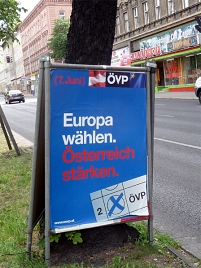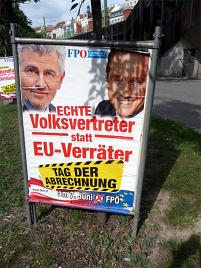Erstellt am: 28. 5. 2009 - 18:00 Uhr
Screaming To Be Heard
- FM4 zur EU-Wahl
This June, Europeans in 27 countries have the opportunity to go to the polls and, in theory, vote on the future direction of the continent. Worryingly for the European Parliament, it’s likely that more than half of them won’t bother.
And there’s worse news for Brussels: those who do vote are likely to use the polling booth as a mid-term report card on the domestic performance of their national parties rather than as a comment on the future direction they would like Brussels to take.
"Voters don’t treat these elections as anything to do with Europe," bemoans Professor Simon Hix of the London School of Economics, who has dubbed the original vote in 1979 as the “first experiment in continental democracy."
But if optimism reigned before the first vote, there is little of it left thirty years on. In the run up to the 7th European Parliamentary elections, voter apathy has surprised no one.
chris cummins
Enthusiasm for the European Union seems, in fact, to be on a downward trajectory. In the early 1990’s, at the start of the single market, about 70% of the EU population thought that their country’s membership in the bloc was a good thing. Now it’s down to 50%. EU disinterest is at its most pronounced among young Europeans. According to recent studies, that pattern is fairly consistent from East to West, a fact that argues against recent EU-expansion as a cause.
So why the apathy?
Many pro-Europeans, particularly of the older generations, will put the decline down to complacency.
The present day EU was created very much as peace project. So while many of us have grandparents who survived an era when Europe was bombing itself into oblivion, and parents who were relieved to be the first generation of Europeans in centuries who weren’t called-up for a European war, for the younger generations, peace is perhaps now taken for granted. Other than in the Balkans, European cross co-operation has been so successful that the EU’s role in securing long-term stability is a given.
It's also true that many of us underestimate the value of the current work of the EU – and how many of us are ready to ridicule it. Perhaps the work in Brussels is condemned forever in the popular mind to be associated with the (recently repealed) regulations on the correct angle of bend in EU-certified bananas.
Johannes Pollack, a European expert from the Austrian Academy of Science, thinks that this is unfair.
“What the European Union has done for Austria is increase safety in every part of our personal lives," he says, pointing out, for example, that it would be senseless for Austria to fight air, soil and water pollution on a national level alone and points to minimum EU standards in labor, product and food safety that directly affect Europeans every day.
chris cummins
Either that message is failing to get through or simply failing to inspire people. Rules and regulations may improve our lives, but bureaucracy is no rallying cry.
Recent interviews I've carried out with young Europeans in Paris, Prague and London about the EU have revealed surprising consistency; and would provide equally uninspiring material for headline writers. There was simply no passion at all, not even passionate skepticism
Instead there is a generally a grudging acceptance of the bloc’s usefulness. As well as making cross-border travel easier, the EU has recently been seen, at least to some extent, as a refuge from the stormwinds of the global economy. But there is also a deeply felt skepticism that they can impact the course Europe is taking or that it will have much of an impact on them.
There have been neither torrents of abuse nor eulogies of praise, just one great transnational shrug of the shoulders.
And shrugs rarely translate into queues at the polling booths.
The Significance of EU Elections
The elections will have a significant impact, of course. As Pollack points out, the 2004 elections made the conservative bloc in the European Parliament the strongest force. The Parliament then selects the Commission, Europe’s executive decision maker, which is often characterized as the driving seat of European politics. So if more Europeans had voted socialist than conservative, the Commission would have had a very different make-up these past four years.
Indeed, it would have probably had a different President instead of the conservative José Manuel Barroso, and it’s likely that it would have proposed very different legislation, particularly in areas like labor law.
Ahead of these elections the socialists' president in the European Parliament, Poul Nyrup Rasmussen, has promised Barroso a struggle to keep his position. If for those dissatisfied with the work of the current Commission, this is perhaps your chance to help vote them out.
chris cummins
That young Europeans don’t immediately and instinctively grasp this is perhaps understandable, given the opacity of the decision making processes in Brussels.
That’s why Simon Hix, who has written a book called What's Wrong with the European Union and How to Fix It, would like the European Parliament to rethink the form and presentation of its elections. A democratic election is a fork in the road of future policy, and Hix believes that each direction we can take needs to be marked by a figure-head, each with a distinctive personality and a recognizable face. That is, after all, how our cultures have come to understand the workings of democracy.
A variety of candidates for the Commission Presidency might be invigorating for the EU, says Hix – a choice between a liberal, a conservative and a green candidate, for example. Then voters could ask national party leaders which of those candidates they support and demand they explain why. Then not only would the voter would have a picture in mind on the way to the booth, but the media would have something focused to write about and we would be less likely to skip over the European politics section when browsing through the morning paper.
Disingenuous Domestic Politics
A high voter turn-out would be a boost in legitimacy for the European project. While reform in Brussels would certainly help, the national governments have to start playing ball too. If voters next month misuse the elections as a chance to rate their national parties, it is because they have been manipulated to do so by those parties themselves.
Johannes Pollack says that national governments benefit from the voters failure to grasp the importance of these elections. There are policy areas where 90% of the decisions are made at the supra-national European level.
“This means that there are few and fewer areas where the national government can make decisions without being influenced by European Union policy," he said. “Would you yourself diminish your own importance?" No.

Radio FM4
Instead the parties focus on promises to outsmart Brussels, rather than co-operate. Even the ÖVP, which would like to see itself as the more pro-European of the two main Austrian parties, is running, in the view of many observers, a fairly provincial campaign.
One campaign poster slogan shouts out “An Europa kann niemand vorbei". On first reading it makes the EU sound, you might think, like a particularly virulent form of seasonal flu. The slogan “Europe votes, Austria decides!" – meanwhile, is hardly a warm endorsement of the benefits of supranational co-operation.
Indeed, like their contemporaries across Europe, the mainstream parties do little to highlight how Austria has directly benefited from the work done (often by Austrians) in Brussels.
Perhaps they hope that the increases in stability,prosperity and infrastructure will be solely attributed to their work on the domestic front?
Or perhaps they are intimidated by the fierce anti-EU campaign in Austria’s mostly widely read newspaper, the Neue Kronenzeitung tabloid, whose editor Hans Dichand, according the alternative weekly the Falter, still dictates the European debate?
The pro-European campaign of a Green party split by infighting, meanwhile, has been so quietly polite that it has gone largely unnoticed.

Radio FM4
Such reticence leaves the park open for the parties furthest on the right of the political spectrum who aggressively attack the EU’s very existence, playing on people’s fears of all things foreign and, often disingenuously, representing the EU as a shadowy presence working against rather than for its citizens. (The Freedom Party has characterized it as a mix between a lobby for industry and a “financial mafia.")
Not surprisingly, the loudest voice tends to be those that are heard, especially when everyone else is whispering.
All of this, replicated in the Czech Republic, Britain and Poland and elsewhere, makes it hard for Brussels to get a positive message out.
But it hasn’t given up.
In a desperate attempt to raise its popular profile, the EU is literally screaming to be heard. The European Parliament has launched a recent marketing campaign of internet videos encouraging the web-generation to get out and vote. In one, a shrieking and scantily clad young woman takes time to cast her vote in the European elections, despite being chased by an axe-wielding maniac (who also casts his vote, but for whom?).
In another a cyclist in a long-distance road race interrupts his glorious breakaway to make use of his democratic right.
The slogan: “There’s always time to vote."
Like the famous bent banana regulation, the adverts have been derided by many. Certainly the choice of form and content are divisive. But Johannes Pollack thinks it’s essentially positive that the EU is shedding its stuffy image and using money to reach out to a younger audience via a medium that is familiar to them.
After all, moaning about being misunderstood and unappreciated simply isn’t enough.


